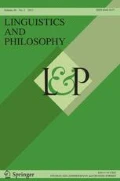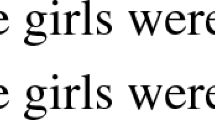Abstract
Bare plurals (dogs) behave in ways that quantified plurals (some dogs) do not. For instance, while the sentence John owns dogs implies that John owns more than one dog, its negation John does not own dogs does not mean “John does not own more than one dog”, but rather “John does not own a dog”. A second puzzling behavior is known as the dependent plural reading; when in the scope of another plural, the ‘more than one’ meaning of the plural is not distributed over, but the existential force of the plural is. For example, My friends attend good schools requires that each of my friends attend one good school, not more, while at the same time being inappropriate if all my friends attend the same school. This paper shows that both these phenomena, and others, arise from the same cause. Namely, the plural noun itself does not assert ‘more than one’, but rather the plural denotes a predicate that is number neutral (unspecified for cardinality). The ‘more than one’ meaning arises as an scalar implicature, relying on the scalar relationship between the bare plural and its singular alternative, and calculated in a sub-sentential domain; namely, before existential closure of the event variable. Finally, implications of this analysis will be discussed for the analysis of the quantified noun phrases that interact with bare plurals, such as indefinite numeral DPs (three boys), and singular universals (every boy).
Similar content being viewed by others
References
Bayer, S. L. (1996). Confessions of a lapsed neo-Davidsonian: Events and arguments in compositional semantics. New York and London: Garland Publishing, INC. (Published 1997).
Beck, S. (2000). Star operators. Episode 1: Defense of the double star. In UMOP 23: Issues in semantics (pp. 1–23). Amherst: GLSA.
Bosveld-de Smet, L. (1998). On mass and plural quantification: The case of French des/du NPs. Ph.D. thesis, University of Groningen.
Brisson C.M. (2003) Plurals, all and the nonuniformity of collective predication. Linguistics and Philosophy 26: 129–184
Carlson, G. N. (1977). Reference to kinds in English. New York and London: Garland Publishing, INC. (Published 1980).
Chierchia G. (1998) Reference to kinds across languages. Natural Language Semantics 6: 339–405
Chierchia, G. (2004). Scalar implicatures, polarity phenomena, and the syntax/pragmatics interface. In A. Belletti (Ed.), Structures and Beyond. Oxford: Oxford UP.
Chierchia G. (2006) Broaden your views: Implications of domain widening and the “logicality” of language. Linguistic Inquiry 37: 535–590
Chierchia, G., Fox, D., & Spector, B. (to Appear). The grammatical view of scalar implicatures and the relationship between semantics and pragmatics. In P. Portner, C. Maienborn, & K. von Heusinger (Eds.), Handbook of semantics. berlin: Mouton de Gruyter.
Chomsky N. (1975) Questions of form and interpretation. In: Austerlitz R. (eds) Scope of American Linguistics. The Peter De Ridder Press, Lisse, pp 159–196
Condoravdi, C. (1992). Strong and weak novelty and familiarity. In Proceedings of the Second Conference on Semantics and linguistic theory (pp 17–37). Columbus: Ohio State University
de Mey, S. (1981). The dependant plural and the analysis of tense. In V. A. Burke & J. Pustejowsky (Eds.): Proceedings of NELS 11. Amherst, GLSA, University of Massachusetts.
de Swart H. (2006) Aspectual implications of the semantics of plural indefinites. In: Vogeleer S., Tasmowski L. (eds) Non-definiteness and Plurality. John Benjamins, Amsterdam, pp 161–189
Dowty D. et al (1986) Collective predicates, distributive predicates and all. In: Marshall F. (eds) Proceedings of ESCOL 86. Ohio State University, Columbus, pp 97–113
Farkas D.F. (2006) The Unmarked Determiner. In: Vogeleer S., Tasmowski L. (eds) Non-definiteness and Plurality. John Benjamins, Amsterdam, pp 81–105
Ferreira, M. (2007). Scope Splitting and Cumulativity. In R. Nouwen & J. Dotlačil (Eds.), Proceedings of the workshop on quantifier modification, ESSLLI 2007. Utrecht
Gazdar G. (1979) Pragmatics: Implicature, presupposition, and logical form. Academic Press, New York
Gillon B.S. (1987) The readings of plural noun phrases in English. Linguistics and Philosophy 10: 199–219
Grice, H.P. (1975). Logic and conversation. In P. Cole & J. L. Morgan (Eds.), Syntax and semantics: Speech acts, (Vol. 3, pp. 41–58). New York: Academic Press (from the William James lectures, Harvard University, 1967).
Gualmini, A., Crain, S., Meroni, L., Chierchia, G., & Guasti, M. T. (2001). At the semantics/pragmatics interface in child language. In Proceedings of SALT 11. Ithaca, NY: CLC Publications, Cornell University.
Guerts B. (2009) Scalar implicatures and local pragmatics. Mind and Language 24: 51–79
Heim, I. (1991). Artikel und Definitheit. In A. von Stechow & D. Wunderlich (Eds.), Semantik: Ein internationales Handbuch der zeitgenossischen Forschung (pp. 487–535). Berlin: de Gruyter.
Hoeksema J. (1988) The semantics of non-Boolean ‘and’. Journal of Semantics 6: 19–40
Horn, L. R. (1972). On the semantic properties of logical operators in English. Ph.D. thesis, UCLA.
Horn L.R. (2004) Implicature. In: Horn L.R., Ward G. (eds) The handbook of pragmatics. Blackwell, Oxford, pp 3–28
Horn L.R. (2005) The border wars—a neo-Gricean perspective. In: von Heusinger K., Turner K. (eds) Where semantics meets pragmatics. Elsevier, Amsterdam, pp 21–48
Kamp H., Reyle U. (1993) From discourse to logic: Introduction to modeltheoretic semantics of natural language, formal logic and discource representation theory. Kluwer, Dordrecht
Kouider S., Halberda J., Wood J., Carey S. (2006) Acquisition of English number marking: The Singular-plural Distinction. Language Learning and Development 2(1): 1–25
Kratzer A. (1980) Die Analyse des blossen Plurals bei Gregory Carlson. Linguistiche Berichte 70: 47–50
Krifka, M. (2004). Bare NPs: Kind-referring, indefinites, both, or neither? In Proceedings of SALT 13. Ithica, NY: CLC Publications, Cornell University.
Landman F. (2000) Events and plurality: The Jerusalem lectures. Kluwer, Dordrecht
le Bruyn, B. (2005). Bare plurals: A unifying analysis for English, French and Spanish. Ms., Utrecht
Link G. (1987) Generalized quantifiers and plurals. In: Gärdenfors P. (eds) Generalized quantifiers. Reidel, Dordrecht, pp 151–180
Link G. (1998) Algebraic semantics in language and philosophy. CSLI Publications, Cambridge, MA
May R. (1985) Logical form: Its structure and derivation. MIT Press, Cambridge, MA
McKay T.J. (2006) Plural predication. Oxford University Press, Oxford
Müller, A. (2001). Genericity and the denotation of common nouns in Brazilian Portugese. In A. Weeler & J.-Y. Kim (Eds.), UMOP 25: Proceedings of SULA (pp. 72–80). Amherst, MA: GLSA.
Noveck I. (2001) When children are more logical than adults: experimental investigations of scalar implicature. Cognition 78: 165–188
Papafragou A., Musolino J. (2003) Scalar implicatures: experiments at the semantics-pragmatics interface. Cognition 86: 253–282
Partee, B. H. (1975). Comments on C.J. Fillmore’s and N. Chomsky’s papers. In Scope of American Linguistics (pp. 197–209). Lisse: The Peter De Ridder Press.
Partee, B. H. (1985). “Dependent plurals” are distinct from bare plurals. Ms., University of Massachusetts.
Roberts C. (1990) Modal subordination, anaphora, and distributivity. Garland Publishing, INC, New York and London
Roodenburg, J. (2004). Pour une approche scalaire de la déficience nominale: La position du français dans une téorie des “noms nus”. Ph.D. thesis, Amsterdam/Paris.
Russell B. (2006) Against grammatical computation of scalar implicatures. Journal of Semantics 23: 361–382
Sadock J.M. (1978) On testing for conversational implicature. In: Cole P. (eds) Syntax and semantics Vol 9: Pragmatics. Academic Press, New York
Sauerland, U., Anderssen, J., & Yatsushiro K. (2005). The plural is semantically unmarked. In S. Kesper & M. Reis (Eds.), Linguistic Evidence. Berlin: Mouton de Gruyter.
Schein B. (1993) Plurals and events. MIT Press, Cambridge, MA
Schwarzschild R. (1992) Types of plural individuals. Linguistics and Philosophy 15: 641–675
Sher G. (1990) Ways of branching quantifiers. Linguistics and Philosophy 13: 393–422
Spector, B. (2003). Plural indefinite DPs as PLURAL-polarity items. In J. Quer, J. Schroten, M. Scorretti, P. Sleeman, & E. Verheugd (Eds.), Romance languages and linguistic theory 2001: Selected papers from ‘Going Romance’. Amsterdam and Philadelphia: J. Benjamins.
Spector B. (2007) Aspects of the pragmatics of plural morphology: on higher-order implicatures. In: Sauerland U., Stateva P. (eds) Presupposition and Implicature in Compositional Semantics. New York, NY, Palgrave-Macmillan, pp 243–281
Winter Y. (2001) Flexibility principles in Boolean semantics. MIT Press, Cambridge, MA
Zweig, E. (2008). Dependent plurals and plural meaning. Ph.D. thesis, New York University.
Author information
Authors and Affiliations
Corresponding author
Rights and permissions
About this article
Cite this article
Zweig, E. Number-neutral bare plurals and the multiplicity implicature. Linguist and Philos 32, 353–407 (2009). https://doi.org/10.1007/s10988-009-9064-3
Published:
Issue Date:
DOI: https://doi.org/10.1007/s10988-009-9064-3




